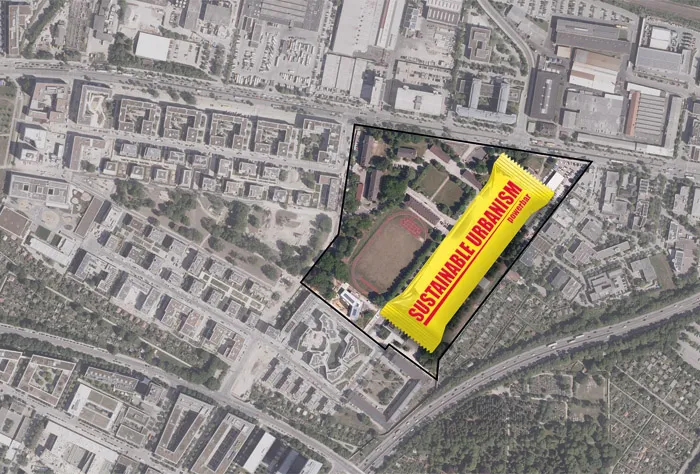Power Bar: inserting a mixed-use building complex into Domagpark
B.A. ARCHITECTURE | INCOMING | M.A. ARCHITECTURE
INTERNATIONAL URBAN DESIGN STUDIO | WINTER 2020/21
(Letzte Aktualisierung:29.09.2020)

Das Studio ist explizit auch für reguläre Studierende der TUM geöffnet. Insbesondere für fortgeschrittene Bachelor-Studierende und Master-Studierende der Architektur eignet sich die Aufgabenstellung. Darüber hinaus kann dieses Studio auch im Rahmen einer Bachelor-Thesis bearbeitet werden. Je nach Zusammensetzung der Arbeitsgruppen wird die Unterrichtssprache Englisch und/oder Deutsch sein.
Cities under pressure! The question of future urban co-existence, mixed-use and sharing is not only being discussed in the phase of the Covid-19 epidemic. The correlation between structural and functional density, built and open spaces, planned, unplanned and appropriated urban settings should always be studied in correlation with social, ecological and economic transformation processes.
Large patches of Munich's inner city fabric are homogenous city-block structures, public parks, historic centers and commercial areas. But sometimes you hit spots where typology and functional program seem to clash. The friction of these spots is especially challenging for future design proposals.
The International Studio in the winter term 2020 will focus on a plot in Munich’s north, in Schwabing-Freimann. Studio challenge at the Chair of Sustainable Urbanism is to develop design answers and ideas regarding the future of urban neighborhoods and quarters. Since 2013, the new quarter at Domagkpark has been emerging on the site of a former military base, the 'Funkkaserne'. This semester we will focus on the issue of large scale building complexes as a central design theme.
A 'power bar' is to be designed and integrated on a currently unused patch within the new quarter: A hybrid, multifunctional building and open space structure which considers the heterogeneous, existing surroundings as well as adding completely new elements. An up to date, social and sustainable urban machine, which through its compactness and stacked uses has less impact in terms of land consumption and can thus also contribute to the preservation and development of high-quality, inner-city open spaces and to the discussion about urban density in general.
Course and crits in English language.
Due to the CoVid-19 pandemic, a teaching concept is being developed, which allows for a completely digital work as well as working and discussing in partial physical presence. The work involves small design teams (2 to 4 students per group).
Schedule
Regular studio work on TUE + WED
Supervision TUE from 2:00 PM @TUMcampus; room 3250 or online
4.11.20 TUE: 2 pm kick-off (online)
12.-13.11.20 THU-FR: field trip and workshop
24.11.20 TUE: pin up 1
15.12.20 TUE: sketching session
19.01.21 TUE: pin up 2
09.02.21 TUE: final crit
Contact: Julian Numberger julian.numberger(at)tum.de